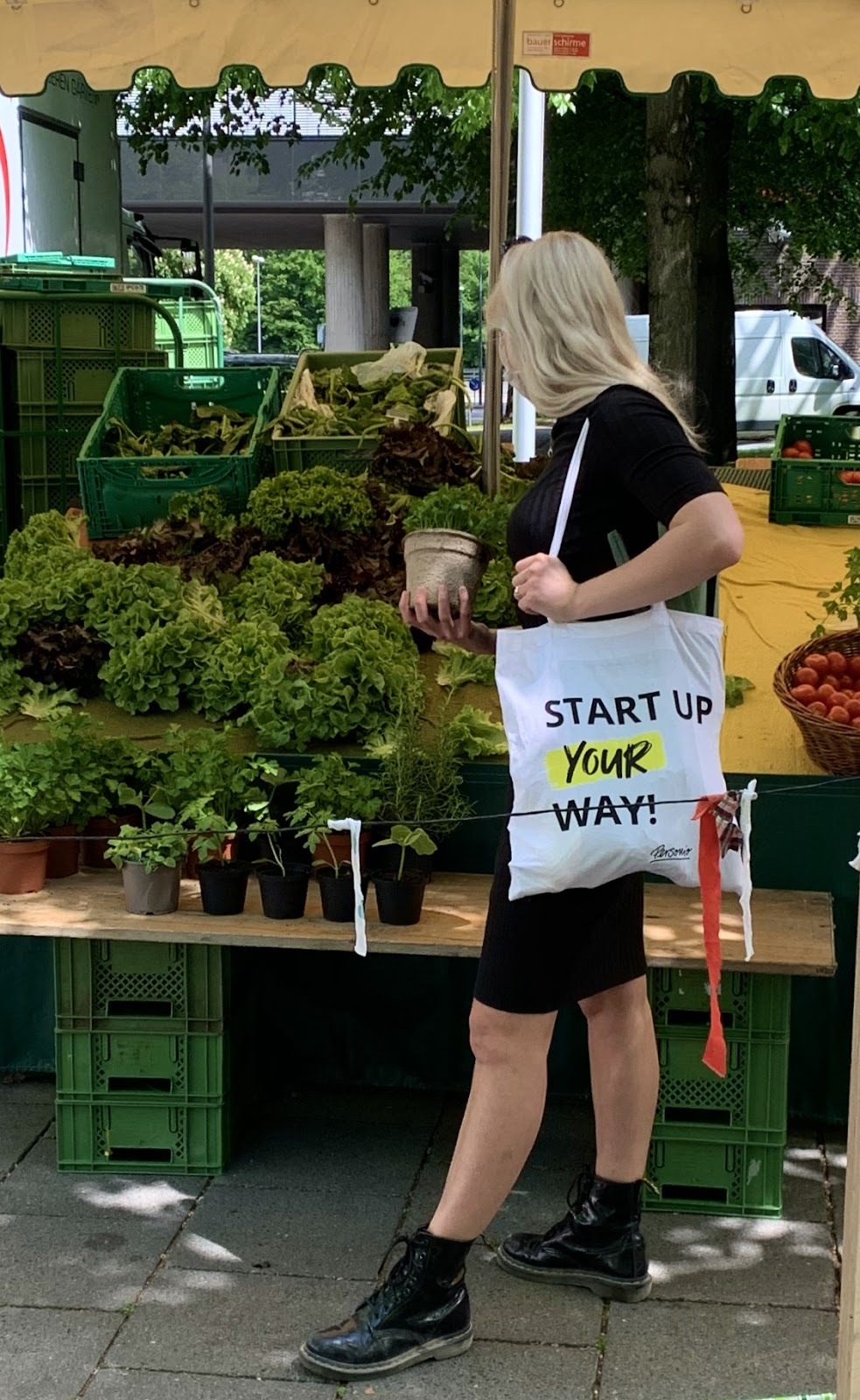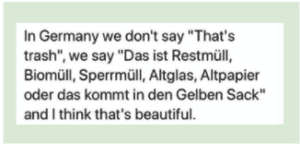
Join One of Europe’s Fastest-Growing Companies
We have over 1,000 employees in Munich, Dublin, Madrid, London, and Amsterdam.
Find Your Next Role8. June 2020
People @ Personio – Life with less plastic

Don't get me wrong. I love trash. I am carrying a serious torch for trashy movies (Sharknado is awesome!). I spend an embarrassing amount of my free time singing along to trashy Trash-Pop-Songs (talking about evergreens like Don’t Cha from The Pussycat Dolls here). And the first time someone called me white trash, it took me some while to understand that, this was not meant as a compliment. Bummer!
"BUT. I DO HAVE a problem with the kind of trash that ends up in landfills and the ocean."
Jana (Junior Customer Service Manager) is very passionate about Sustainability. We have asked her to share her thoughts as part of our weekly newsletter during the home office period and in her “Home Story”, Jana shares her tips on living a life with less plastic and as part of our sustainability committee, she helps us to make our office life greener, too.
According to National Geographic, a whopping 91% of plastic isn’t recycled. Why is this a problem you ask? Because plastic is not broken down. It has to be ground up by wind and waves over a long period of time. A long period of time meaning up to 450 years to decomposition. It takes up to 20 years for a plastic bag. Up to 50 years for a cup. Plastic bottles are sometimes only shredded after, yup, FOUR HUNDRED AND FIFTY years. So, most of it still exists in some form. In many regions of the oceans, there are up to 60 times more plastic particles than plankton. Plastic is killing more than 1.1 million seabirds and animals every year. And not just animals are affected: The average person eats 70,000 microplastics each year. You could be swallowing a credit card’s weight in plastic every week. Twenty-four-hour champagne and microplastic diet. Damn tasty.
“Where you movin’? I said onto better things”
Why should we care about the waste that we produce you ask? Considering that about 8 million tons of plastic waste escape into the oceans from coastal nations every year, does it really make a difference compared to the billions of people who don’t try to change their own wasteful habits?
I know the enormity of the plastic problem might be overwhelming. I’m guilty of this. I dwell on all the pieces swirling in our oceans like sinister confetti and think, well, what’s one more iced-coffee lid? Why focus on individual action when corporations are creating all this crap, and governments aren’t doing much about it? Yes, we need to lobby for massive structural change, and consumer pressure can affect policy. Individual choice matters, too. Small steps lead to big changes.
Since deep in my heart I hope to know that we Personios are generally an environment-friendly bunch, I am super thrilled to share my journey with you and maybe even give you some inspiration towards transitioning to less waste production at your home.
I have been, let’s say, “committed” to the environment for a long time. But during my studies and the first time living alone I discovered that although I considered myself to be environmentally conscious, I produced a huge amount of plastic waste. Every. Single. Day. Going out, snacking, cooking, cleaning, buying clothes etc.
I care about this earth. But quite frankly: I was not behaving that way. So, I started to change things. One habit at a time. The journey was incredible. I achieved a less-waste-lifestyle by identifying what my trash was and then figuring out ways to reduce it. It’s like a game. And just to be clear: I am definitely not a hundred percent zero waste yet. Not even close. For e.g. Ferrero Raffaello, some drugstore products and coconut yogurt I have not found any adequate replacements yet. But taking actions and living a lifestyle that aligns with my worldview makes me so incredibly happy.
“Sounds like a saying from a fortune cookie or someone would put on a cheesy wall tattoo, but for me, this is a proven truth: You can only change yourself. Change begins with the individual.”
If you are also keen to be more conscious about your own waste production: Just start somewhere. Don’t aim for perfection – that’s boring. The journey is the reward. Haha, oh dear, my apologies for yet another fortune cookie talk. Start simple. Look at what you are throwing away. Then pick one thing, find a solution to it, implement it into your life, and once it feels natural, choose something else, and go little by little. Straight on gamification technique 😉
If you are looking for some simple transitions to start, here are two simple steps towards less waste:
1. Recycle No new news alert! Jesus waves from his dinosaur! Recycling helps to reduce the pollution caused by waste. I read this Twitter post the other day and I was feeling it:

Especially important for me is emphasizing on composting food scraps as opposed to throwing them away. According to an analysis by AWM, Munich’s residual waste still contains almost 40 % organic waste! This is a shame since this could be composted and used to make clean energy. The AWM currently collects around 44,000 tons of organic waste from Munich households every year. The fermentation process of organic waste produces energy-rich biogas, which is converted into electricity in a combined heat and power plant. More than 1,000 Munich households can be supplied with this electricity. An important contribution to public services and climate protection, don’t you think?
I also want to share this little hack for small apartment owners: It seems so obvious once you try it and makes composting a hundred times better. Before doing this, I was going crazy with all the fruit flies in my kitchen during summer times. Now my compost bag sits in the freezer and nothing smells or becomes rotten before I have a chance to throw it in my building’s compost bin.
2) Go to the farmers’ market I will have a thing for farmers’ markets till cows come home. I love farmers’ markets more than Kanye loves Kanye. It’s just my thing. Since forever. I grew up at a farm myself (no veggies, but for Christmas trees) and also worked at a market stall every weekend while I was still going to school. I just loved trying to convince Franconian grandmas to cook with Pak Choi. I had a deep affection for goods straight from the producer ever since.
Apart from being able to get all your greens sexy, fresh, and plastic-free, it sometimes feels simply quite good to get to know the person who baked your bread, instead of walking through the supermarket completely anonymously. Right?
For me, this really has become a tradition. Here in Munich, you’ll find me picking out broccoli and stuffing my face with fresh fried Apfelküchle (Battered Apple Cakes) at the market every Saturday. I normally go to Munich’s most ancient farmers’ market, which is held on the Fritz-Hommel-Weg at the Nordfriedhof. I always go home not only heavily loaded with all sorts of goods but also frankly, happily.
“Happiness for me? All this food and not a single piece of plastic at sight.”
I also like to stop by at the market on Josephsplatz on Tuesdays because they have the most gorgeous flowers. My absolute favorite is the one in Lehel right at Sankt Anna Platz. The atmosphere is so cozy and the location is great! Shout-out to Claudia for recommending me the Topfenbrot by demeter Hofbäckerei Steingraber. I had it last Thursday and was amazed by how one girl can eat a whole loaf of bread in one day. It was so tasty. During late summer they also sell various old apple and pear types, which can be tasted right at the stall. Claudia also recommended the Vikualienmarkt in Pasing since they have many old tomato varieties in all imaginable colors and shapes (not organic but regional and seasonal).
If you want to check out markets close to you in Munich, find all information here: www.muenchner-bauernmaerkte.de/

